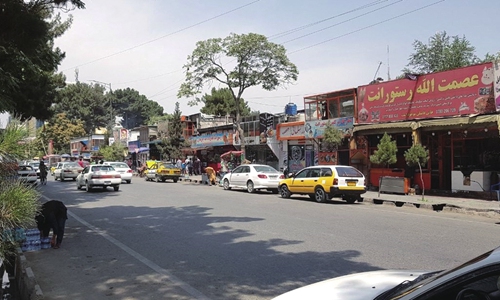
A snapshot taken from a street in Kabul, Afghanistan, on August 17 Photo: IC
The situation in Afghanistan has undergone great changes in the past few days, and some experts said Chinese businesses can provide support for the country's much needed reconstruction, from building roads to providing educational support and solving employment problems.
Joint economic projects between China and Afghanistan will also take on great regional significance in an effort to help improve the lives of the Afghan people and beyond, experts said.
After the drastic change in Afghanistan and US' bungled and embarrassing withdrawal from the country, economic development and reconstruction is the hope for all the Afghan people, a goal which US aid in the past 20 years have clearly failed to achieve, experts said.
The US spent a lot of money in Afghanistan over the past two decades. But instead of progress, they only delivered great volatility, division and poverty.
"The US legacy is only some international concepts and better education for women and children in major cities like Kabul. In the area of livelihood, there was no help at all, despite the loss of many US and allies' soldiers and huge [capital] investment," Qian Feng, director of the research department at the National Strategy Institute at Tsinghua University, told the Global Times on Sunday.
In the past two decades, four million Afghans have been displaced and 2.7 million Afghans have fled the country, according to media reports.
Different from the US and some other Western powers, China's economic support is likely to be widely accepted in Afghanistan, experts have claimed.
China has always adhered to the principle of non-interference in other countries' internal affairs and pursued a policy of peaceful coexistence and being a good neighbor, not to mention that China is the only neighboring country that has not brought geopolitical conflicts to Afghanistan, Hu Shisheng, director of the Institute for South Asian Studies at the China Institutes of Contemporary International Relations, said, noting that there are no complicated and thorny cross-border issues between China and Afghanistan.
This makes it easier for China to "get involved" in Afghanistan's future economic reconstruction process, Hu said.
It is not China alone that has helped Afghanistan, and some other countries including India have also been involved. However, some experts have noted that "among the neighboring countries, maybe only China has the ability and experience needed to help Afghanistan quickly overcome its economic difficulties, in the future."
Afghanistan's GDP per capita is now 213th in the world, life expectancy at 53.25 years-old, the lowest in the world, with 14 million people facing severe hunger, according to media reports.
In January 2002, China pledged $150 million in aid to Afghanistan within five years, half of which was free aid and half was concessional loans.
In addition to donations, China has assisted Afghanistan in building irrigation water supply project, hospital, as well as providing material assistance and human resources training.
In July 2009, Aynak Copper Mining in Afghanistan, which has had operations contracted to Chinese companies, was officially opened, but the mining work has been put on hold.
"Our copper mine and oil field were previously agreed upon, but they have been unable to be developed since water, electricity and roads are not guaranteed due to regional instability," Liu Zongyi, the secretary-general of the Research Center for China-South Asia Cooperation at the Shanghai Institutes for International Studies, told the Global Times.
If the conditions are met, it will greatly enhance trade between the two countries, create many local jobs and improve people's livelihood, industry insiders said.
In terms of trade, China has given zero tariff treatment to 278 kinds of Afghan exports to China since July 1, 2006.
"This preferential policy should continue if China recognizes the Taliban's rule in the country," said Liu. "We hope that the situation in Afghanistan will stabilize and more opportunities can be unleashed under the Belt and Road Initiative (BRI)."
During the 4th China-Afghanistan-Pakistan Trilateral Foreign Ministers' Dialogue in Guiyang in June, presided by Chinese State Councilor and Foreign Minister Wang Yi and his counterparts of Pakistan and Afghanistan, the three countries reached consensus on deepening high-quality BRI cooperation, supporting substantive expansion of cooperation in Afghanistan, and enhancing connectivity among the three countries and in the region at large.
China is a vigorous partner for the war-battered country to get its economy back on track and can help Afghanistan's reconstruction through the BRI based on the principle of reciprocity, said Qian, indicating that China has accumulated experience in working with developing countries, including in the fostering of "lifeblood" for the economy.
China does not export hegemony. China exports its economy but does not interfere with the internal affairs of outside countries. "This is exactly what the Afghan Taliban needs when they come to power," said Qian.
"As a friendly neighbor and sincere friend of Afghanistan, China always upholds a friendly policy towards the entire Afghan people. This did not, does not and will not change," the Chinese Foreign Ministry spokesperson Zhao Lijian told a regular press conference on Wednesday.
Zhao noted that China will continue to support peace and the reconstruction throughout the country, and provide assistance targeting socioeconomic development in Afghanistan as China's ability permits.




